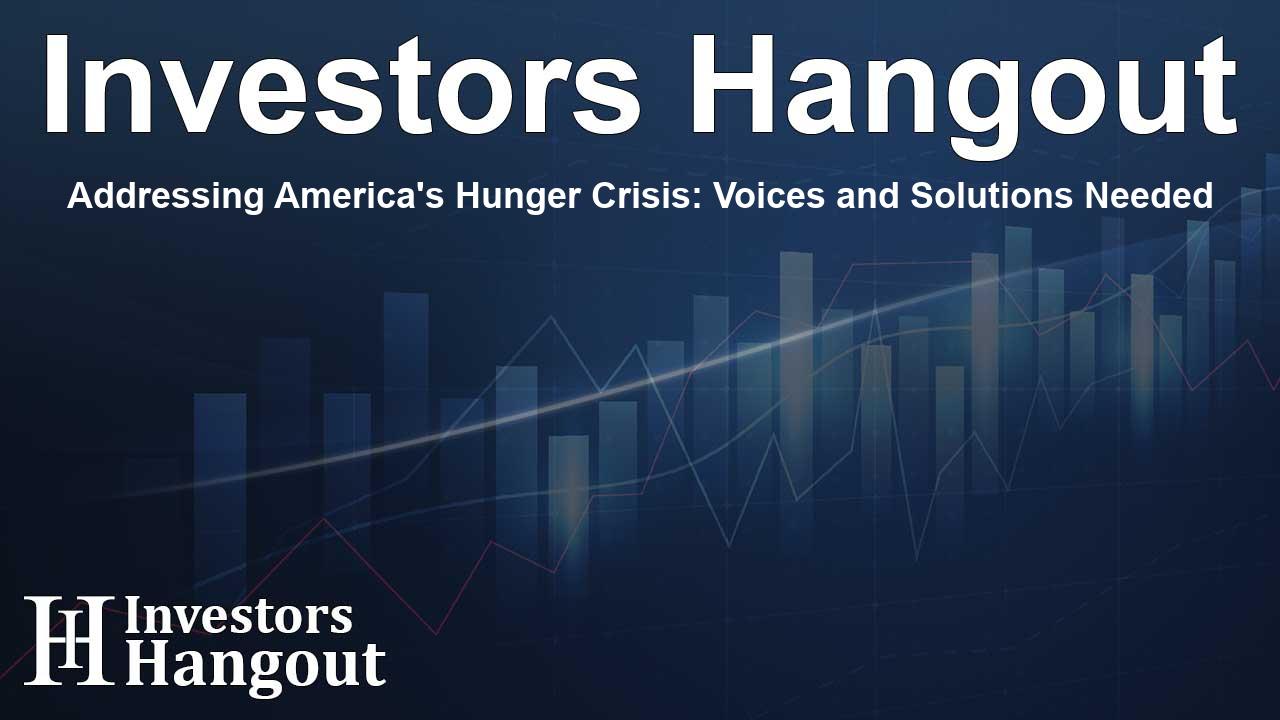Addressing America's Hunger Crisis: Voices and Solutions Needed

Urgent Advocacy for Change in Food Insecurity
Neighbors experiencing hunger across the nation are calling for immediate action from leaders to tackle food insecurity as many struggle to afford nutritious options. According to recent insights, a significant percentage of individuals express a desire to eat healthier but find it nearly impossible due to financial constraints.
Insights from the Recent Reports
One notable report reveals that almost 70% of respondents want to improve their eating habits, but many are hindered by the skyrocketing costs of living. The report serves as a critical annual evaluation of hunger across America, capturing the voices of those facing food shortages.
Hear from Those Affected
Claire Babineaux-Fontenot, a leading figure in food advocacy, emphasizes the importance of listening to individuals directly impacted by hunger. She highlights how food crises often intertwine with other pressing issues such as housing instability and health challenges, advocating for comprehensive solutions. She urges collective efforts to overcome hunger, stating, "When our neighbors thrive, we all thrive. Let’s be inspired by this resolve and create meaningful change together."
Challenges Faced by Communities
This year's report sheds light on the persistent hurdles that affect many households:
- An alarming 80% of individuals resort to purchasing cheaper, less nutritious food due to elevated food prices, indicating a concerning trend toward compromised health.
- Over half of respondents (52%) reported running out of food within the year before they could afford more, with a notable number indicating it happened recently.
- A significant portion (51%) has delayed vital bill payments over the past year to manage grocery expenses.
- Despite these challenges, there is a glimmer of hope as 81% of respondents are ready to engage actively in policy reforms aimed at improving food access.
Priorities for Change
Neighbors insist that efforts to eradicate food insecurity must also encompass health improvement, expanded opportunities, and enhanced dignity. Their insights reflect their urgent needs:
- Health Concerns and Stress: Nearly 80% of respondents feel their health is at risk, with many expressing the inability to afford healthier food options. This financially driven limitation leads to significant stress and anxiety.
- Persistent Economic Strains: The compounded effects of food inflation, which saw a drastic increase since recent years, make survival a primary focus, hindering personal growth and community improvement efforts.
- Calls for Stronger Policies: A staggering 90% of participants believe it is crucial to streamline anti-hunger policies to ensure everyone, especially children and seniors, can access necessary food assistance programs.
The Ongoing Commitment to End Hunger
The initiatives outlined are part of a broader commitment to address the systemic issues contributing to hunger in America. Engaging the voices of those with lived experiences is vital for shaping effective interventions. There is a collective understanding that reaching a hunger-free society requires collaborative efforts, from policymakers to community members.
Join the Movement
For those looking to take action or learn more about how to support the fight against hunger, resources and actions can be found through various platforms dedicated to this cause. Advocacy, awareness, and community involvement are essential to make a substantial difference in the lives of those facing food insecurity.
Frequently Asked Questions
What is the main finding of the recent hunger report?
The report highlights that many neighbors want healthier food options but face affordability issues, emphasizing a dire need for systemic change.
How do high food prices impact people's health?
Many individuals buy cheaper, less nutritious food, as it is more affordable, leading to health risks and increased stress levels.
What actions are neighbors willing to take to address food insecurity?
Over 81% of respondents are eager to participate in policy reforms that enhance food access and improve the situation for those in need.
Why is it important to consider the voices of those experiencing hunger?
Listening to affected individuals helps shape effective strategies for addressing hunger, ensuring that solutions are grounded in lived experiences.
How can individuals support the movement against hunger?
People can engage in advocacy, support local food programs, and share information to raise awareness about food insecurity issues in their communities.
About The Author
Contact Thomas Cooper privately here. Or send an email with ATTN: Thomas Cooper as the subject to contact@investorshangout.com.
About Investors Hangout
Investors Hangout is a leading online stock forum for financial discussion and learning, offering a wide range of free tools and resources. It draws in traders of all levels, who exchange market knowledge, investigate trading tactics, and keep an eye on industry developments in real time. Featuring financial articles, stock message boards, quotes, charts, company profiles, and live news updates. Through cooperative learning and a wealth of informational resources, it helps users from novices creating their first portfolios to experts honing their techniques. Join Investors Hangout today: https://investorshangout.com/
The content of this article is based on factual, publicly available information and does not represent legal, financial, or investment advice. Investors Hangout does not offer financial advice, and the author is not a licensed financial advisor. Consult a qualified advisor before making any financial or investment decisions based on this article. This article should not be considered advice to purchase, sell, or hold any securities or other investments. If any of the material provided here is inaccurate, please contact us for corrections.
